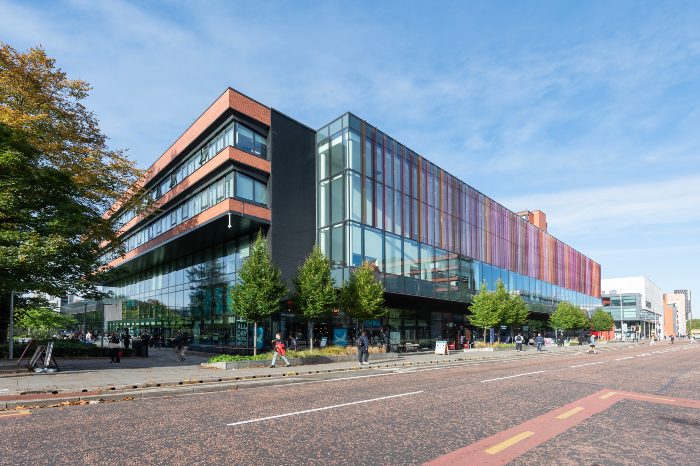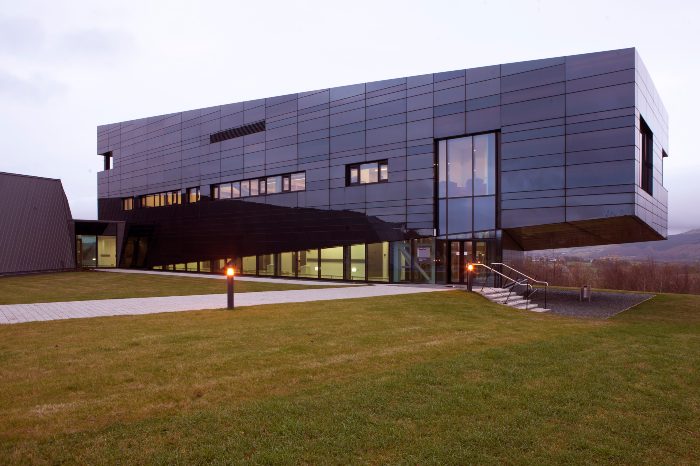In 2025 several of our partner institutes and centres are celebrating important anniversaries. From understanding the cosmic universe, to mitigating climate change and nurturing tomorrow’s business leaders, the Manchester family is at the forefront of progress at home and across the globe.
60 years of Alliance Manchester Business School
(Words by Vinayak Seth)
In 2025, Alliance Manchester Business School (AMBS) celebrates 60 years at the forefront of business education and research. While its pioneering heritage is rightly revered, it is AMBS’s current work – and the positive impact it’s having globally – that’s truly exciting.
AMBS is a vibrant hub of innovation, collaboration and enterprise. Its research teams tackle urgent challenges: driving sustainable business, boosting UK productivity, advancing digital transformation, and supporting global health. The Productivity Institute, based at AMBS, leads the national conversation on closing the productivity gap and building a resilient economy. Its sister, Manchester Institute of Innovation Research, is a world-leading centre in science, technology and innovation policy, shaping thinking on emerging technologies and system transitions.
Previously known as Manchester Business School, AMBS changed its name in 2015 following a transformational gift from the Alliance Family. From his time supporting UMIST’s School of Management to his ongoing work with the Law School, Lord Alliance’s influence spans the School’s history.
Our 60th anniversary isn’t just a celebration; it’s a reckoning with what business must become.
Delivering real-world impact
AMBS’s commitment to societal progress is furthered by the Sustainable Consumption Institute, which explores how consumption and production can facilitate a greener future, and the Work and Equalities Institute – championing fair, inclusive workplaces. These institutes, together with AMBS’s Centres – including the Centre for the Analysis of Investment Risk, Decision and Cognitive Sciences Research Centre, and Centre for Financial Technology Studies – bring together experts from diverse disciplines to deliver research with real-world impact.
Nurturing entrepreneurial talent
In its 60th year, AMBS is reimagining business education and shining a light on the future of business for a changing world. Its curriculum is shaped by the latest industry needs and global trends, ensuring students graduate with the skills, agility and mindset to thrive. Through experiential learning, live consultancy projects and entrepreneurial programmes, it empowers students to apply their knowledge and make a difference from day one.
The Masood Entrepreneurship Centre, also part of AMBS, plays a key role in nurturing entrepreneurial talent – helping students and alumni develop ideas, launch ventures and build the confidence to innovate. Meanwhile, the Executive Education Centre offers cutting-edge leadership development at all points of a career, helping professionals adapt and lead in an era of constant change.
"Our 60th anniversary isn't just a celebration; it's a reckoning with what business must become. Whether it's dealing with economic disparities, global geopolitical upheaval, climate change, or the impact of new technologies, we are living in pivotal times that call for fresh thinking, bold leadership, and meaningful action. As well as teaching the leaders of tomorrow, business schools have a crucial role to play in research, discovery, promoting innovation, and tackling these grand challenges with impact."
Professor Ken McPhail, Head of Alliance Manchester Business School
A global family
AMBS is a truly global community, with teaching centres in Hong Kong, Singapore, Dubai and Shanghai, and an alumni network spanning more than 176 countries. The School continues to seek out alumni to be part of its story through mentoring, volunteering, or funding scholarships, helping to amplify its impact and continue shaping a brighter future for business and society.
Sixty years on, AMBS is more dynamic than ever. Together, we’re challenging, innovating and leading positive change for the next generation.

The Alliance Manchester Business School
Dalton Nuclear Institute turns 20
(Words by Marina Jacob)
Born out of an essential need for nuclear capability, the Dalton Nuclear Institute (founded in 2005) has grown into the UK’s leading academic focal point for nuclear research and development. Uniquely spanning the entire nuclear fuel cycle, its work is helping to identify and train the nuclear experts of tomorrow.
Pushing boundaries in nuclear science
Named after and inspired by John Dalton – the Manchester scientist whose groundbreaking atomic theory laid the foundations for modern chemistry – the Institute is pushing boundaries in nuclear science and engineering. It draws its interdisciplinary strength from all three University Faculties, collaborating on subjects ranging from radiation science and nuclear materials, to fusion power, energy policy and waste management.
The Institute’s experimental laboratory, the Dalton Cumbrian Facility, located near Sellafield in Cumbria, supports leading research into the effects of radiation and decommissioning technologies. This plays an important role in minimising the costs of dealing with the UK’s nuclear legacy, while securing a future characterised by affordable energy supplies. These activities are part of a vibrant and inter-connected nuclear ecosystem in West Cumbria, as well as benefitting the wider world’s ambition to mitigate climate change through low-carbon energy sources.
Prioritising education for informed decision-making
Education and training are central to the Institute’s mission. Through initiatives like the SATURN Centre for Doctoral Training, it’s equipping the next generation of leaders with the skills to innovate in nuclear science and technology, and address the social challenges of today. Embodying the Manchester values of knowledge, wisdom, and humanity, the programmes give students the tools to make more informed decisions for the benefit of society and the environment.
"As we see renewed interest in nuclear energy as part of the UK's future mix, it's inspiring to see the vast range of work going on across the Dalton Nuclear Institute. Nowhere else in UK academia comes close to the combination of talent, experience, facilities, connections and impact we have built here in 20 years. It's a huge personal privilege for me to lead the Institute into its third decade."
Professor Zara Hodgson, Director of the Dalton Nuclear Institute
Advising policymakers and inspiring future generations
Through its Dalton Nuclear Policy Group, the Institute also provides informed evidence-based advice on advanced nuclear energy and waste management to policymakers and their advisors.
Across the Institute, collaborations with industry leaders including Sellafield Ltd., Amentum, and the UK National Nuclear Laboratory, combined with the influential positions a number of Dalton academics hold with national and global nuclear organisations, help to ensure research is relevant and impactful.
Teamwork and community engagement are promoted through interactive workshops and outreach programmes. Dalton supports a community of STEM Ambassadors to inspire an interest in nuclear science and related careers among young people, and has organised international fora to discuss solutions to complex issues facing the industry. These initiatives advance cutting-edge research and spark meaningful conversations that shape the future of global energy systems.
Entering its third decade, the Dalton Nuclear Institute represents a shining example of how research that brings together academic staff, researchers, students, policymakers and industry partners can help reimagine solutions for a healthier, more equitable and sustainable future.

The Dalton Cumbrian Facility
Jodrell Bank: 80 years of pioneering radio astronomy
(Words by Mia Bossy)
Home to the UK’s largest radio telescope, Jodrell Bank Centre for Engagement celebrates 80 years of research, innovation and contributions to the field of radio astronomy.
The astronomical observatory was founded by physicist Sir Bernard Lovell at the end of World War II, as a place to observe and examine cosmic rays. However, after setting up his radar kit in the Cheshire countryside, it wasn’t cosmic rays he found, but meteors. This accidental discovery marked the beginning of radio astronomy at Jodrell Bank.
Becoming a UNESCO world heritage site
The site plays a pivotal role in our understanding of the cosmic universe. It has tracked space missions, receiving transmissions on the Grade I-listed Lovell Telescope, and collaborated with international astronomers in the discovery of over three-quarters of the known pulsars. In recognition of its contributions to science and technology, Jodrell was declared a UNESCO World Heritage Site in 2019, highlighting its importance globally and ensuring its preservation for generations of astronomers and engineers to come.
As a cultural powerhouse, we have grown alongside the University and inspired generations through education and public engagement.
A hub of innovation and culture
Today, as the University’s astronomical research centre, it continues to drive innovation and foster interest, asserting Manchester’s position at the forefront of scientific discovery. Its operation of the e-MERLIN network – a group of seven radio telescopes across the UK – enables astronomers to study the universe with high-resolution imaging. e-MERLIN contributes the most telescopes of any participating country and is at the core of the world’s largest Very-Long-Baseline-Interferometry (VLBI) network, the European VLBI Network (EVN), facilitating collaboration and ongoing research.
Jodrell also connects science with culture as the original home of Bluedot Festival. The unique festival, launched in 2016, blends scientific discovery with music, offering opportunities for public and educational engagement. The festival, and the numerous music and public events at Jodrell each year, celebrate the intersection of science and culture, while also inspiring the next generation of scientists who could help to shape the future. These activities enhance Manchester’s reputation as a centre for scientific innovation and discovery, impacting scientific communities worldwide.
A forever pioneer of astronomical discovery
Jodrell Bank continues to be a beacon for scientific research at the University, pushing the boundaries of our current understanding and driving collaboration across the world. Its commitment to education, public engagement and research secures its place as a pioneer of astronomical discovery, and is set to inspire generations to come.
"We're proud to work alongside our colleagues in the Observatory, welcoming people of our region and nation to Jodrell Bank to connect with its pioneering research past, present and future. As a UNESCO World Heritage Site and a cultural powerhouse, we have grown alongside the University, embraced artistic expression, and inspired generations through education and public engagement."
Professor Teresa Anderson, Director of Jodrell Bank Centre for Engagement

The Lovell Telescope at Jodrell Bank
Tyndall Manchester at 25: Co-creating bold solutions for a sustainable world
(Words by Aidan Rhode)
The Tyndall Centre for Climate Change Research (known as Tyndall Manchester) is celebrating 25 years at the forefront of climate change science and policy. Founded in 2000, in partnership with The University of Manchester, the Centre brings together engineers, social scientists, economists, and environmental researchers to develop bold, evidence-based solutions to support a more sustainable world.
Tyndall Manchester sits at a crossroads of past and future. Manchester was the world’s first industrial city and the birthplace of the Industrial Revolution. It was here that the world’s reliance on burning fossil fuels took root – and where a new legacy is being forged today. The Centre plays a key role in addressing the consequences of the city’s carbon-intensive history, positioning Manchester today as a global leader in climate action.
"Having interdisciplinarity and policy relevance at our core from the outset has fundamentally shaped how Tyndall has operated and evolved over the last 25 years. I am incredibly grateful to the many people whose shared vision and commitment have made Tyndall a success and sustained it well beyond its core funding period of nine years."
Professor Carly McLachlan, Director of Tyndall Manchester
Cultivating innovative partnerships
The team at Tyndall Manchester produce pioneering research on carbon budgets, energy transitions and sustainable transport. Their work has informed government climate strategies, helped city regions (including Greater Manchester) develop ambitious carbon reduction plans, and influenced business and industry to rethink their environmental impacts.
One of its innovative collaborative partnerships came in 2019, when the Centre partnered with iconic trip-hop collective Massive Attack to investigate the carbon footprint of their live music tours. The resulting Super Low-Carbon Live Music roadmap has since shaped discussions in the music industry about reducing emissions without compromising creativity. In 2025, the band broke the world record for producing the lowest ever carbon emissions at a gig in their hometown of Bristol.
The work continues to evolve, with the Centre being part of the UN Accelerator City Programme in Liverpool that seeks to decarbonise live music, film and TV – sharing insights with other cities globally.
Having interdisciplinarity and policy relevance at our core from the outset has fundamentally shaped how Tyndall has operated and evolved over the last 25 years.
A truly collaborative approach
Working with partners to co-produce research is central to Tyndall’s ethos, and the Centre engages directly with local people, policymakers and civil society. Through workshops, public forums and advisory roles, it supports bottom-up climate action while shaping top-down policy. Working at different scales, its researchers are driven to ensure that their interdisciplinary research translates into meaningful real-world outcomes – whether for a single neighbourhood or an entire nation.
As the Centre looks to the next 25 years, its focus remains firmly on accelerating transitions to net-zero emissions, enhancing resilience to climate impacts, and ensuring that the benefits of change are shared fairly.
At home in the city that lit the spark of the industrial age, the Tyndall Centre now carries a torch for a just and sustainable tomorrow – one grounded in rigorous research, radical collaboration and a commitment to a better world.
Learn more about our partner institutions and centres on their websites: AMBS, Dalton Nuclear Institute, Jodrell Bank and Tyndall Manchester.


.jpg)

.jpg)
.jpg)